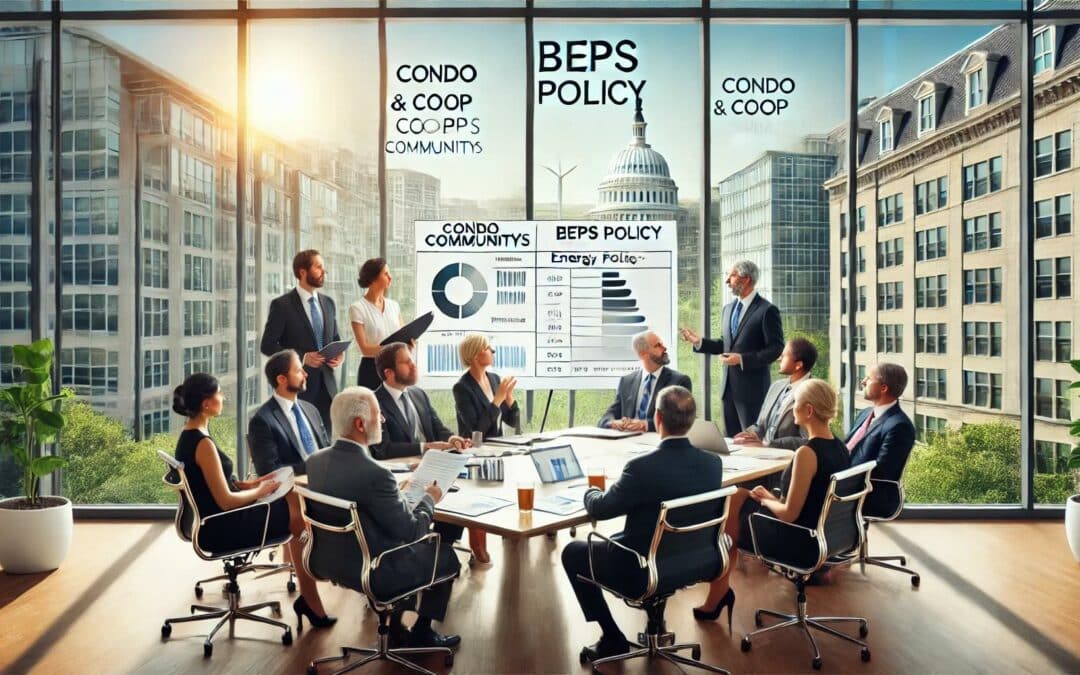CAI: Community Association Institute
BEPS: Building Energy Performance Standards
Condominium and Coop homeowners, representing nearly one-third of DC property owners, have been largely excluded from the development of the Building Energy Performance Standards (BEPS) policy, as there are no representatives from this stakeholder group on the BEPS Task Force. On June 24, 2024, the DC CAI BEPS Subcommittee Chairs, including Honeydew CEO Julian Belilty, attempted to rectify this oversight by meeting with the Environmental Affairs Committee Director for the DC City Council to advocate for condominium and cooperative homeowners.
Concerns Raised by the Subcommittee
Lack of Equitable Enforcement
The subcommittee expressed concerns that the BEPS policy is not equitably enforced, as it completely exempts single-family property owners with properties below 10,000 square feet. Research indicates that these single family homes are significantly less energy-efficient, on a per capita basis, than multi-unit buildings. This exemption places a disproportionate burden on condo and co-op owners to help DC meet its ambitious clean energy goals..
Submetering Challenges
A significant barrier to policy compliance is the prohibition of submetering in master-metered condominium buildings. Current regulations prevent these buildings from submetering individual units and billing residents based on usage. This limitation hinders the ability of community associations to incentivize reduced utility consumption and comply with BEPS.
Governance Restrictions
The covenants and bylaws of condo/coop associations typically restrict their powers to enforce necessary energy conservation measures within owner units, complicating compliance efforts. This structural challenge requires a policy adjustment to enable effective enforcement.
Legislative Recommendations
The subcommittee provided several legislative recommendations to the Committee Director:
- Policy Structure
- Suspend compliance penalties for multi-family residential buildings until Phase II in 2032.
- Continue data collection and provide interim guidance for meeting goals.
- Incorporate at least two community association representatives in the DOEE Task Force on BEPS.
- Exemptions
- Eliminate broad exemptions for smaller buildings.
- Exempt, or heavily subsidize, Limited Liability Cooperatives from BEPS Compliance
- Establish appropriate energy consumption levels per capita instead of per square foot, with protections for vulnerable populations.
- Use established mechanisms for real estate tax collection with partial exemptions for resident owners and senior citizens.
- Submetering
- Amend DCMR Chapter 44 to permit submetering and appropriate charging for energy consumption in multi-family buildings.
- Mandate tiered energy consumption charges to encourage reduced usage.
- Metrics
- Use a per capita metric for energy scoring to ensure equitable treatment across different housing sizes and types.
- Funding
- Improve the operational capabilities of the DC Green Bank to support these initiatives.
Conclusion
The meeting underscored the need for inclusive policy development that considers the unique challenges faced by condo and co-op homeowners. By addressing these concerns and incorporating the recommended changes, the DC City Council can create a more equitable and effective BEPS policy, ultimately contributing to the district’s sustainability goals.
Honeydew Energy Advisors remains committed to working through the DC CAI Subcommittee to advocate for the best interests of their clients to City Council. If you have any feedback on this initiative or would like to get involved, please email Andrew at az@honeydewadvisors.com.

